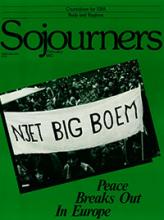I receive many good, thoughtful letters. Two especially struck me the last few weeks and sparked some responses for "Marginal Notes." One is from an Iowa farm woman who describes herself as a "seeking parent." The other is from another seeking woman, a Catholic sister living in Chicago.
"I am a mother of five (three college students and twins 10 years old). My husband is an Iowa farmer, who works from 7 a.m. to 7 or 8 p.m. (average) every day, with a main objective of supporting his family and saving just enough money so his children will not have to support us when we are past 65 or so.
We welcomed President Reagan partly because we felt he would stand against communism's march on the free world. You see, even in your recent article, "Against the Consensus," you stated that both governments, the U.S. and Russia, are trying to push their ideas onto other countries. However, I have always felt it was Russia and communism that was coercing and that we were trying to defend nations so that they could choose their own way.
A nuclear holocaust seems inevitable. It frightens me, as a mother especially. My hope is that Jesus will come again and that God will cut short these days of horror.
I have been led to believe that in a battle if one side has guns and the other doesn't, the side without guns will be annihilated. Do you propose that God will defend one side? I'm sure he could, but I'm not certain he would, for Jesus said God's rain falls on the just and the unjust, and I'm not even sure that one nation is more just than the other.
I do not have the ability to put on paper all my questions. I am totally confused. I chose to write to you because your articles challenge me to live the Christian life as Jesus taught it. Can you help a seeking parent and citizen?"
****
Read the Full Article

